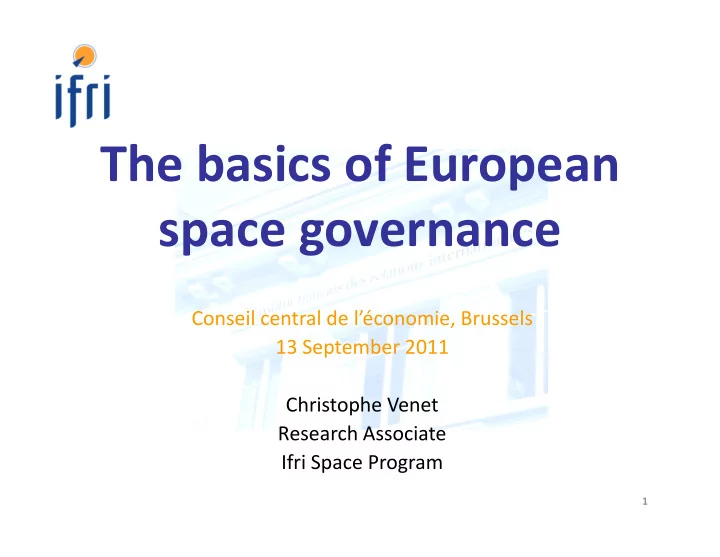

The basics of European space governance Conseil central de l’économie, Brussels 13 September 2011 Christophe Venet Research Associate Ifri Space Program 1 1
Purpose of the conference • Main objective: � Provide an overview of European space governance evolutions, almost two years after the Lisbon Treaty and five months after the EC space strategy � Come up with a balanced view taking full account of the � Come up with a balanced view taking full account of the complexity of the issues at stake • How to get there: � First panel: structural trends, key transversal issues � Second panel: impact on specific programmes � Third panel: focus on specific actors 2 2
What is European space governance? • No single definition of governance: � « Governance is about the maintenance of collective order, the achievement of collective goals and the collective process of rules through which order and goals are sought » (Mazurelle et. al., 2009) (Mazurelle et. al., 2009) � European Space Governance (ESG) is « the combination of legal norms that emanate from international, European and national legal frameworks which, together, organize a coherent European decision-making process in both space policy and programmatic activities » (Ibid.) 3 3
What is European space governance? • Implications: � Governance is at the crossroads of policy, politics and polity (substance, processes, actors) (substance, processes, actors) � Governance is an instrument, not a goal � Governance implies power-sharing 4 4
Why did ESG become an issue? • Starting point = increasing political relevance of space � ESA used to be the main European space actor � Rise of a new category of actors: space users � Rise of the EU as a new institutional actor in space � Rise of the EU as a new institutional actor in space • Space is a political endeavor ( Wise Men Report , 2000) � Space is a policy tool for the EU, both domestically and globally � Task of ESG: define and implement this policy 5 5
Why does ESG matter? • Potential threats: � Contrast between unity of technological basis and diversity of space users � Discrepancy between technical and industrial potential and lack of political will to develop a coherent space policy lack of political will to develop a coherent space policy • ESG must be considered in the broader framework of the European integration process � Permanent tension between sovereignty issues/integration dynamic 6 6
What is the current situation? • Triangle EU/ESA/Member States: � Central role of Member States (consequence of the political nature of space) � ESG is primarily of intergovernmental nature • EC/ESA Framework Agreement � EU federates user demands/ESA performs R&D activities to meet user requirements • Lisbon Treaty � Recognises strategic (i.e. political) importance of space � Shared competence 7 7
What is at stake? • Central challenges for ESG: � Conciliate different national priorities/positions/situations � Sustainable funding � Decision-making authorities + procedures � Decision-making authorities + procedures � Military space � Gather user communities � Transition from R&D to operational phase � Support the European space industrial basis 8 8
Recommend
More recommend